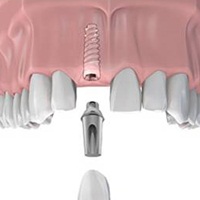What are Dental Implants?
A natural tooth consists of a crown (the part you see above the gum), and the root (the part hidden under the gum, within the jawbone). It is the root, which actually holds the natural tooth in place. When a person is missing a tooth, the dentist must decide how to re-create the crown portion, and choose the best method to hold it in place. Dental implants were created for this purpose.
Dental implants are metallic cylinders, which are placed into the jawbone where original teeth once existed. These root like cylinders are used to secure a replacement tooth in place when a tooth is missing. Dental implants can also be used to secure teeth in place that are loose by being placed alongside these loose teeth and anchoring to them with splinted crowns. This will allow the loose teeth to function better, and last longer, in the mouth.
Dental implants are made of various biomaterials. Most commonly, a surgical metal called titanium is used, because it is the most compatible with human biology. They are surgically placed in the jawbone, right in the dentist's office, using a local anesthetic. Approved and tested implant systems are very successful. In fact, some have lasted more than 20 years with a better than 90% success rate. Patients who have good oral hygiene and take care of their new teeth can enjoy implants that last a lifetime.
Why do I need Dental Implants?
People lose one or more teeth for a wide variety of reasons, including infection, gum disease, accident or injury. When natural teeth are removed, many problems occur. The remaining teeth shift, rotate and become crooked. An improper bite will develop, making it very difficult to chew food properly. Spaces and gaps between teeth may cause embarrassment, problems with speech, and lack of self-esteem. Dental implants, when properly placed, can restore missing teeth, thereby eliminating these potential problems. People who have teeth replaced with dental implants report better ability to chew food and eat properly, renewed confidence while speaking, and better self-esteem.
Self Test:
If you have been thinking about getting dental implants, you are probably wondering if you are a possible candidate for this procedure. You can take this simple test to see if this procedure might help you.
Ask yourself the following questions:
Am I missing one, two, or more teeth?
Do I hide my smile because of unsightly spaces between my teeth or because I am missing teeth?
Do I lack confidence when I smile, speak or eat?
Am I having trouble eating, chewing, or speaking properly?
Are my teeth loose, or am I getting or in need of treatment for advanced gum disease?
Do I have dentures that slip or cause sore spots when I chew?
Do my dentures need to be relined frequently because of bone resorption?
Do I carry my complete or partial dentures in my pocket or leave them at home?
Am I having any problems with existing crowns or bridges, either functionally or cosmetically?
Are the teeth holding my bridge loosening or moving?
Can I wait three to nine months for the entire implant process to be completed?
Will I be willing to commit to the high standard of home care that is necessary to properly maintain a dental implant?
Will I follow up with regular dental checkups?
Do I believe that my life could be improved if my teeth were improved?
If you answered "yes" to one or more of these questions, you may be a candidate for the dental implant procedure.



